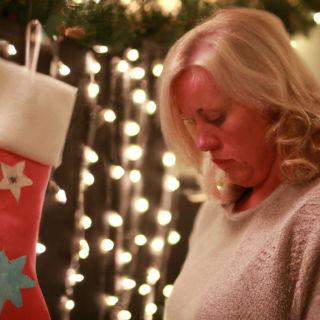.png.jpg?itok=5QECTJgE)
For many, the holiday season is one that is endured, not celebrated.
Source: Elitsa Deykova/Canva
Like gifts under the tree, grief comes packaged in various shapes and sizes. We grieve the death of loved ones and loved ones still living, but no longer with us. We grieve for what once was and for what will never be. Grief accompanies unrealized dreams, missed opportunities, and even our sense of self, and while grief is a universal experience, it is also unique for each of us.
Regardless of how you celebrate, or who or what you’re grieving, it’s normal to feel loss more acutely during the holidays. If that’s you and you’re dreading this time of year, here are six tips and tools to help you navigate the holidays.
1. Make a List and Check It Twice (or More)
Before succumbing to the hustle and bustle of your holiday “To Do” lists, consider creating a different list this year: A “Control” list. To begin, check in with how you’re feeling and which people, places, or things are creating feelings of anxiety or overwhelm. Then, identify which are within your control and which are not. For example, where you celebrate — if you do so at all — is within your control. Whether your estranged loved one attends the holiday meal, is not.
While this may feel awkward at first, discerning what you can and cannot control is a tool that creates a powerful shift. Not only does it provide you with clarity, but it also helps to highlight how or where to direct your energy, so you can preserve it rather than drain it. This is an especially helpful tool when you find yourself feeling disappointed, overwhelmed, or anxious. So, remember to make your lists and update them as needed.
2. Practice Presence Not Presents
Dying affords a unique perspective on what matters most, so deathbed regrets tend not to include a longing for “more stuff”. Instead, such reflections tend to include more time with loved ones. This is a valuable reminder for all of us, especially when the pressure to shop, wrap, and deliver can add undue stress and wreak havoc on a griever’s already fragile physiology.
So, while mass commercialization may be good for local and national economies, consider the impact on you, personally. If gifting as usual feels overwhelming, give yourself permission to skip the stuff-buying frenzy this year and turn your focus toward sharing the gift of time with loved ones, instead. Your end-of-life self just might thank you for it.
3. Curate Comfort and Joy
Recently, a client asked me if “powering through” was a reasonable approach to navigating the holidays. This may sound like an agreeable coping mechanism, but it’s not. Six weeks of fake-it-until-you-make-it simply isn’t a sustainable strategy. Instead of pretending you aren’t impacted by your loss or going through the motions for someone else’s benefit, try shining a light on what you need and get curious about what helps you feel better.
Start by returning to your control list — this time to identify what feels good to you. That client, for example, discovered that wearing her late mother’s favorite sweater — which still carries her mom’s scent — had a calming effect, so she has decided to wear it as often as she chooses, even if others raise an eyebrow! Conversely, she found hosting her annual cooking-baking party was bringing added stress, so despite worrying about disappointing others, she canceled.
Canceling or saying “no thank you” to what doesn’t bring comfort or joy may be hard, but doing so creates space to say “yes” to what does. In this way, you are not only honoring your loss and your grief but yourself as well.
4. Tweak-or-Trash Tradition

Ambiguous grief hurts during the holidays
Source: Elitsa Deykova / Canva
The Holidays are steeped in tradition, which can be both a source of comfort and pain. Regardless of the past, know that you aren’t required to do what you’ve always done; tweak your tradition, pause it, or start a new one altogether! There are many ways to honor your loved one, whether as part of a formal, traditional ceremony or a newly created ritual. For Sarah, a mom of three, grieving the sudden and unexplained loss of her adult child to estrangement, this holiday requires a look at family traditions. “I’m dreading all of it,” she told me about the holidays. “I haven’t spoken to him in nearly a year, and he doesn’t want contact with any of us. Still, I just can’t bring myself to exclude his stocking from the mantle, and not have gifts for him under the tree. I know it’s a long shot, but I’m hoping he shows up — if he doesn’t, we’re going to do our best to hold him close from afar.”
Whether your loved one has died or is still living, consider modifying your traditions if they prove too painful. Be it in public or in private, at a place of worship, or in your own living room, how you choose to do so is up to you.
5. Yule Log-Off
Newlyweds in matching pajamas, grandparents doting on grandchildren, beloved family traditions being introduced to a new generation. These are just a few of the innumerable images awaiting grievers online. If scrolling socials compounds your holiday heartbreak, it may be wise to take a break from social media. While we may understand that what we’re seeing is a curated collection that tends to showcase life’s best moments — not our painful ones — scrolling can sometimes feel like a punch in the gut. But don’t think this means you’re a Scrooge. Feeling envious of others is common — not because you don’t want that happiness for others, but because you are so acutely longing for these moments yourself. That doesn’t make you a “bad” person, it makes you human. So, tune in to how you feel: If the glow of your social media screen isn’t making you feel warm and cozy, add it to your list of things within your control, and give yourself permission to log off until you’re ready to reengage…whenever (if ever) that may be.
6. Grinch It
If despite your best intentions, nothing is sparking your holiday spirit, channel your inner Grinch, retreat, and try again next year. “Drop the expectations,” says Meghan Riordan Jarvis, a trauma therapist specializing in grief and loss. “I remind grievers that it can be harmful to their mental health to try to recreate holidays from the past or to pretend that this year’s is not different.”
This may not seem like a revolutionary idea, but it was for me during my first holiday with grief. That year, I went through the motions with the energy I didn’t have and suffered adrenal fatigue mid-month, the consequences of which lasted until Spring. Today, I know better.
“If you feel like making plans, do so”, Riordan Jarvis told me, “but check in with yourself a few hours before to see if you have the energy — and cancel your plans if you don’t. Pretending is too energetically expensive and you need energy to get through the holidays with the least amount of pain possible.”
Regardless of who you are grieving, for how long, or why, no one knows your grief better than you do. So as you face the next few weeks, find what healthy modalities ease your ache, and release the rest. Whether that means finding comfort in the company of others or selecting the solitude of silent nights, may peace find you early and often, and may you emerge more deeply connected to yourself and the love you carry within.
